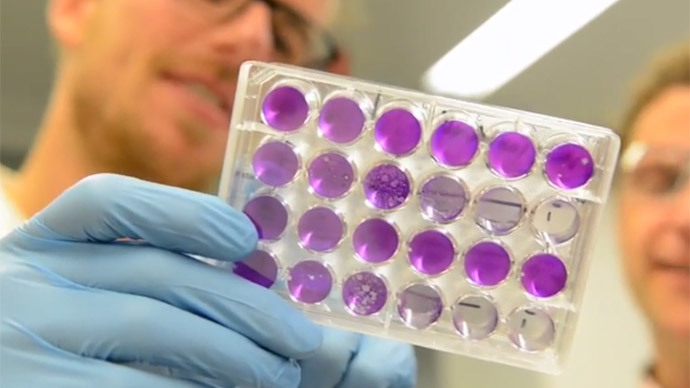New drug ‘100 percent successful’ in treating previously incurable hepatitis B

Australian scientists have used an experimental cancer drug to completely cure hundreds of mice suffering from chronic hepatitis B. The treatment is now being trialed on humans, and could be used to cure diseases like HIV and drug-resistant tuberculosis.
“We were 100 per cent successful in curing HBV (hepatitis B virus) infection in hundreds of tests in preclinical models,” said Marc Pellegrini, who led a team at Melbourne’s Walter and Eliza Hall Institute, Australia’s oldest medical research facility.
The team, whose findingswere published in Proceedings of the National Academy of Sciences (PNAS) journal this week, used birinapant, a US-created cancer drug, which has been trialed on over 350 Americans, but has yet to go on sale.
“Birinapant enabled the destruction of hepatitis B-infected liver cells while leaving normal cells unharmed. Excitingly, when birinapant was administered in combination with current antiviral drug entecavir, the infection was cleared twice as fast compared with birinapant alone. We are hopeful these promising results will be as successful in human clinical trials, which are currently underway in Melbourne, Perth and Adelaide,” said Pellegrini.
According to the World Health Organisation, more than 350 million people are affected by chronic hepatitis B, mostly in developing countries in sub-Saharan Africa and Asia. The disease can cause liver and kidney failure and cancer, and where they are affordable, retroviral drugs have to be taken for the patient’s entire lifetime, or until he or she can be given an organ transplant. More than 700,000 die from it each year.
Pellegrini said the drug restores apoptosis; a biological mechanism that clears damaged cells, which are affected by both, cancer and hepatitis.
“Normally, [healthy] liver cells would respond to infection by switching on a signal that tells the cell to destroy itself ‘for the greater good’, preventing further infection. However our research showed that the virus commandeers the liver cells’ internal communications, telling the cells to ignore the infection and stay alive. Birinapant flips the cell survival ‘switch’ used by the virus, causing the infected cell to die.”
The Australian team believes that targeting the cell, and not the virus itself, is not only more effective, but also avoids the emergence of drug-resistant strains of any virus, which is a growing danger.
“It is relatively easy for an organism to adapt to a drug, but it is very difficult to adapt to a change in the host cell. The virus relies on the survival mechanisms of the host, so if it can’t exploit them, it dies. Such a monumental change in the virus’ environment may be too big a hurdle for it to adapt to.”
Pellegrini believes birinapant and similar medicines could be used to combat numerous other illnesses.
“Pathogens that infect and reside inside host cells, including viral diseases such as HIV, herpes simplex and dengue fever, and bacterial infections such as tuberculosis, could all potentially be cured in a similar way,” he said.
Developed by mid-sized Pennsylvania company Tetralogic, birinapant has been undergoing medical tests since 2009, and is currently undergoing Phase II trials, meaning it is likely still several years away from hitting the shelves.












